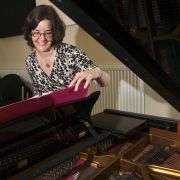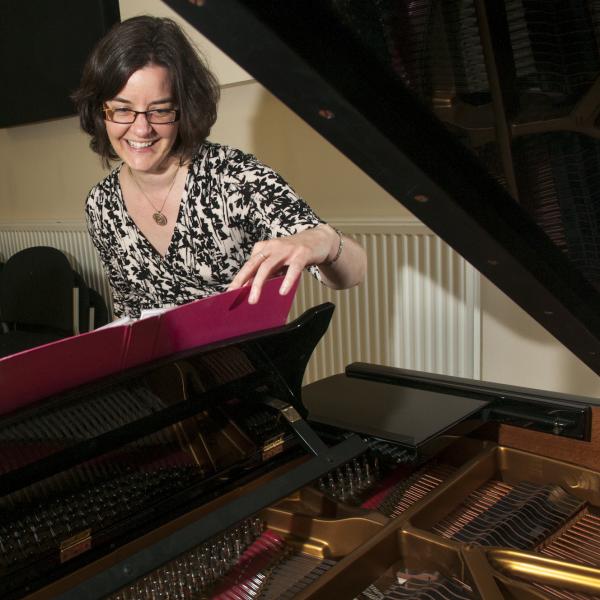University of Sheffield research ‘sparks’ new consultancy to make research more accessible for arts and cultural organisations following the Covid-19 pandemic
Research by the University of Sheffield’s Performer and Audience Research Centre (SPARC), has been the catalyst for a new consultancy that is helping arts, heritage and performance organisations nurture and grow their audiences in the wake of the pandemic.

Research by the University of Sheffield’s Performer and Audience Research Centre (SPARC), has been the catalyst for a that is helping arts, heritage and performance organisations nurture and grow their audiences in the wake of the pandemic.
During the Covid-19 pandemic SPARC collaborated on an Arts and Humanities Research Council (AHRC) funded cross-faculty project, led by Professor Vanessa Toulmin, which found that smaller, newer and freelance artists and venues were most vulnerable to the effects of the pandemic. When it became apparent the social restrictions introduced during lockdown would last a lot longer than initially intended, the project called for sustained funding for those affected, leveraging funds from Sheffield City Council and evaluating the effects of the Cultural Recovery Funds.
Working to identify ways in which they could make their research expertise more widely available for the sector during this turbulent time, academics from the centre set up the SPARC Consultancy to help the sector create new strategies for audience engagement, learning and participation and increased reach.
The aim for the consultancy is to help arts and cultural organisations plan their activities in order to bounce back from the difficulties of recent years and grow audiences to become more sustainable in the long-term.
SPARC Consultancy is led by Professor of Music Education at the University of Sheffield and member of the Government’s Department for Digital, Culture, Media and Sport (DCMS) College of Experts, Stephanie Pitts, who has a track record of over fifteen years working with arts venues and organisations. SPARC Consultancy is now working with a variety of arts, heritage and performance organisations to help them explore what audiences and participants are looking for and how to engage with visitors in a post-Covid-19 world.
The value of the arts has become much more prominent in recent years, with many people experiencing the health and wellbeing benefits of engaging with the arts, music and heritage events during the pandemic.
“For audiences and participants, arts events and activities are shown to boost social connectedness and sense of purpose, and contribute greatly to our sense of wellbeing mentally and physically. That's why it's so important for our cultural sector to thrive and not just struggle to survive.”
Prof Stephanie Pitts
Professor of Music Education
The consultancy is working with a variety of organisations around the country to help them plan their activities in order to bounce back from the difficulties of recent years and grow audiences to become more sustainable in the long-term.
This includes Concerteenies, a Sheffield-based group which organises concerts designed to engage babies, toddlers and their grown ups in live music of all kinds. The research evaluation and report produced by SPARC for the group provided tailored advice on how to navigate the local amateur music sector and help Concerteenies focus its audience engagement.
Polly Ives from Concerteenies, said: “The project addressed key questions our funders, performers and producers wanted to know about the concerts’ reach live and online, the experience of those involved; from children and our musicians to parents, carers and nursery practitioners. It also provided insight on what effect the programme had on the language skills, confidence, engagement and its long term impact through follow up activities inspired by attending and participating in its ‘Musical Stories’ concert series.”
The Covid-19 pandemic hit amateur music groups particularly hard, with singing groups taking the brunt of social restrictions designed to protect the nation from the rapidly spreading virus. Previous research done by SPARC in the ‘’ report, investigated connections between leisure-time musical groups and their local communities, showing groups of all sizes, genres and varieties play a strong role in the lives of their members, their audiences, and potentially their wider communities.
Peterborough Sings! is a music education charity which supports four choirs, Peterborough Male Voice Choir, Peterborough Voices, Peterborough Community Chorus and Peterborough Youth Choir, as well as an extensive outreach programme providing free singing tuition to children and young people across the city and promoting the benefits of singing across the local community.
The charity is working with SPARC on an Arts Council England-funded survey of amateur men’s and women’s choirs which will be a definitive study of equal voices choirs in the UK and which will allow them to identify ambitions for the future development of amateur choirs in the UK.
Peterborough Sings! Director William Prideaux, said: “This is an ambitious and exciting project which will provide a better understanding of the how, why and when of amateur choirs nationally and what makes them tick! It will allow us to explore the challenges of sustaining and developing choir membership and reaching and engaging with underrepresented groups of potential singers which more fully represent the communities we live in.”
Professor Pitts said: “As we move past the restrictions put in place for the pandemic, our research is helping organisations find ways to diversify their events and include innovative digital spaces to allow audiences to engage how they want with leisure and entertainment.
“However, independent, smaller, or amateur arts and music groups sometimes do not have the resources or skills to be collecting and analysing the kind of data that will allow them to plan events and exhibitions that will appeal to their audiences and find new ones. That's exactly why we set up the SPARC Audience Consultancy, to help these organisations nurture and grow audiences, extending the benefits of their activities to the wider community.”
SPARC Audience Consultancy are available to work with music, arts and heritage organisations to collect crucial data on audiences, venues and artists that can be fed directly into plans to support organisations to sustain their audiences and grow for the future. Find out more here:


